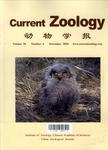Evolutionary responses to climate change and contaminants: Evidence and experimental approaches
气候变化和污染物的进化反应:证据和实验方法作者机构:Department of Biology Westminster College 442 Meldrum Science Center Salt Lake City UT 84105 USA Department of Environmental Toxicology The Institute of Environmental and Human Health Texas Tech University 1207 Gilbert Drive Lubbock Texas 79416 USA Environmental Science and Studies Program Towson University 8000 York Rd. Towson MD 21252 USA
出 版 物:《Current Zoology》 (动物学报(英文版))
年 卷 期:2015年第61卷第4期
页 面:690-701页
核心收录:
学科分类:0710[理学-生物学] 07[理学] 070601[理学-气象学] 09[农学] 0706[理学-大气科学]
主 题:Climate change Multiple stressors Adaptation Experimental evolution Quantitative genetics
摘 要:A fundamental objective within ecotoxicology lies in understanding and predicting effects of contaminants. This ob- jective is made more challenging when global climate change is considered as an environmental stress that co-occurs with con- taminant exposure. In this multi-stressor context, evolutionary processes are particularly important. In this paper, we consider several non-"omic" approaches wherein evolutionary responses to stress have been studied and discuss those amenable to a mul- tiple stressor context. Specifically, we discuss common-garden designs, artificial and quasi-natural selection, and the estimation of adaptive potential using quantitative genetics as methods for studying evolutionary responses to contaminants and climate change in the absence of expensive molecular tools. While all approaches shed light on potential evolutionary impacts of stressor exposure, they also have limitations. These include logistical constraints, difficulty extrapolating to real systems, and responses tied strongly to specific taxa, populations, and/or testing conditions. The most effective way to lessen these inherent limitations is likely through inclusion of complementary physiological and molecular tools, when available. We believe that an evolutionary context to the study of contaminants and global climate change is a high priority in ecotoxicology and we outline methods that can be implemented by almost any researcher but will also provide valuable insights [Current Zoology 61 (4): 690-701, 2015].



